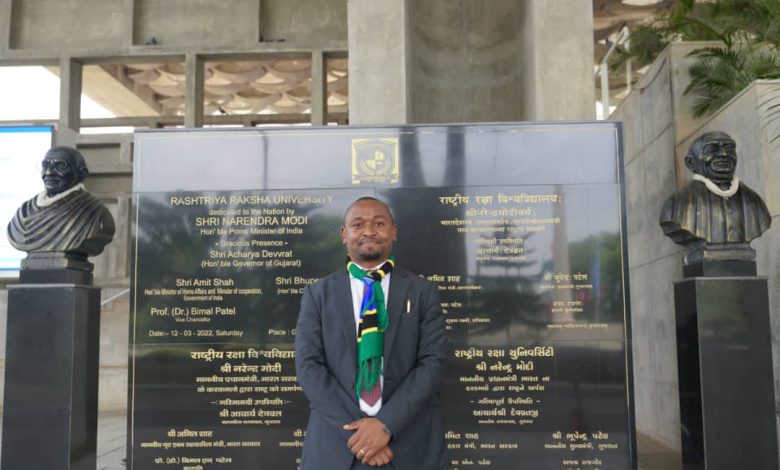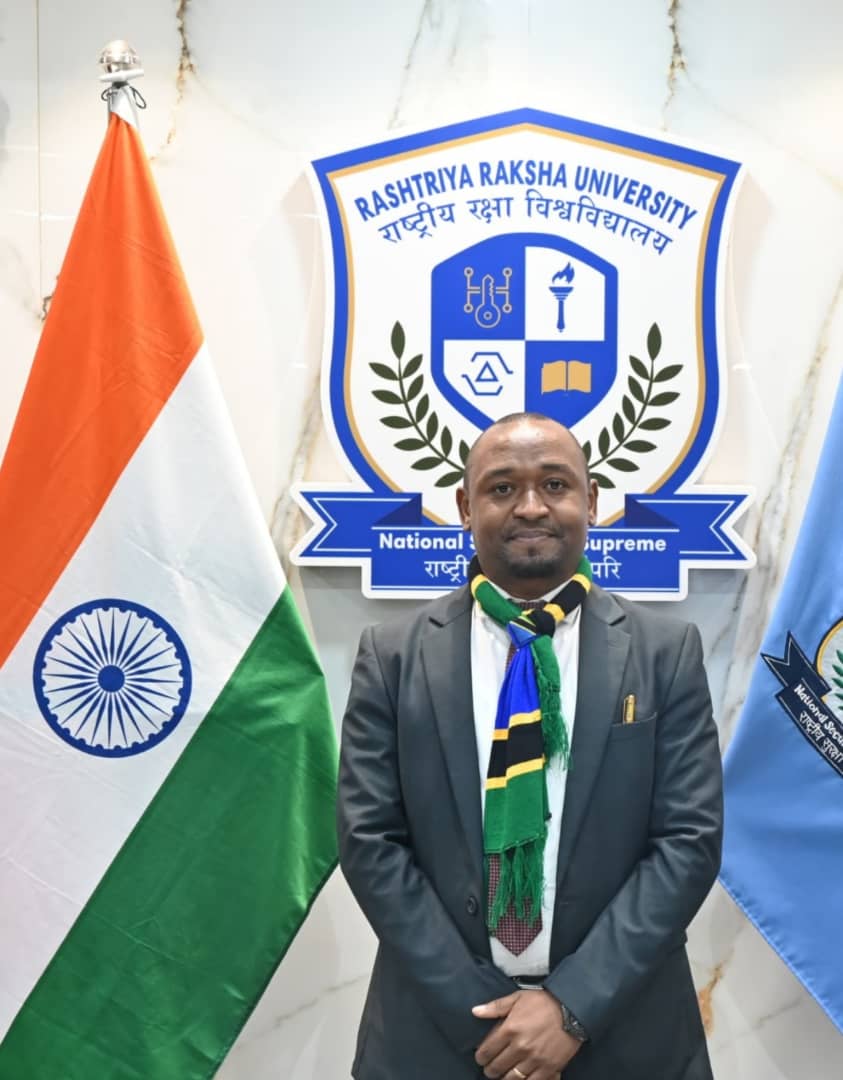Shaping Tanzania’s Global Future: Insights from India on International Law, Diplomacy, and Investment.

“International law and strategic partnerships are vital to shape Tanzania’s path in the global South.”
The pursuit of scholarships often stems from different personal and professional ambitions. For me, the motivation was clear: To expand intellectual curiosity and earn a place at the table of global wisdom. India’s growing economic cooperation with Tanzania provided the ideal setting for this journey, so I applied for ITEC programmes provided by the government of India under its Ministry of external affairs in coordination with its High Commission in Tanzania. As the only culture whose soft-power influence has become planetary through yoga, education, and emerging technologies India presents a unique platform for intellectual and professional exchange.
India’s rise, alongside China, as one of the new global economic giants reflects a wider shift in world affairs. The liberalization of China in 1979 and India in 1991 unlocked vast opportunities for business and diplomacy. For Tanzanian professionals, particularly those in law, diplomacy, and academia, building advanced skills in this context is not optional it is essential. That conviction guided me to Rashtriya Raksha University (RRU) in Gujarat, where I joined the Fundamentals of International Law and Security programme, alongside lawyers, law enforcement officials, and career diplomats.
At RRU, I experienced first-hand the breadth of international law, negotiations, diplomacy, and security studies. Under the guidance of experts such as Professor Yash Vardhan, and Professor Sanitya Kalika, we explored maritime law from global international law principles, and how they can assist African, Asian, and Indian perspectives identifying concrete avenues for cooperation between Tanzania and Bharat. Participants engaged in live discussions with Justices of the ICJ and ICC, analyzed the interpretation of MOUs, and debated real-world dispute settlement practices. Such exposure underscored the importance of building technical skills that strengthen Tanzania’s legal and diplomatic capacity in international fora.
Equally significant were the lectures on diplomacy and soft power, led by Dr. Aparna Varma. In an era of contested narratives and geopolitical competition, the ability to wield influence through culture, development aid, humanitarian assistance, and diplomacy is critical. These lessons highlighted why soft power is no longer a secondary instrument, but a central tool of international relations in the 21st century.
The programme also deepened my understanding of national security, this was vital for aspiring leaders and patriots. A key expert, Professor Prabhakaran Paleri’s holistic framework of 33 elements of national security including human well-being, governance, cyber threats, and environmental security offered an expansive view far beyond conventional military lenses. For professionals from Africa and Asia, this broadened scope of security studies in international law and diplomacy provided insights directly relevant to our domestic and regional challenges.
India’s global posture further demonstrates why its experience matters for Tanzania. Unlike traditional powers, India does not rely on “boxer diplomacy.” Instead, it has emerged as a balancing voice for the Global South participating in G20 and G7 meetings, strengthening BRICS, and amplifying perspectives of developing nations. President Samia Suluhu Hassan’s historic state visit to India in 2023 reflected this convergence of interests and the growing importance of Bharat–Tanzania relations.
India’s Strategic Value for Tanzania
India’s global ascent carries deep implications for countries like Tanzania. Unlike many traditional powers whose engagement in Africa has often been resource-extractive, India’s approach has emphasized capacity-building, education, technology transfer, and soft power diplomacy. For Tanzanian professionals, this offers a rare opportunity: to engage with a major power not merely as passive recipients of aid, but as active partners in knowledge creation and institutional strengthening. The scholarship programmes under India’s ITEC initiative, of which Rashtriya Raksha University is a key beneficiary, are more than academic exchanges they are instruments of long-term diplomacy, equipping the next generation of African professionals to take ownership of their countries’ strategic direction.
The Global South and the Modular World Order
One of the central takeaways from my time at RRU was the recognition that the international system is no longer strictly bipolar or unipolar. Instead, we live in a modular world order where influence, partnerships, and power are distributed across diverse coalitions. The rise of the Global South, led by voices like India, Brazil, South Africa, and increasingly Tanzania within the East African Community, signifies a gradual rebalancing of world affairs. This shift matters because it widens the negotiating space for developing nations. Rather than aligning rigidly with a single bloc, countries like Tanzania can pursue issue-based coalitions, forging pragmatic partnerships in trade, security, and investment. For Tanzanian policymakers, this flexibility is an asset but only if supported by professionals who understand the nuances of international law and diplomacy.
Soft Power as a Strategic Asset
The reflections on soft power, as discussed at RRU, resonate strongly with Tanzania’s own trajectory. Our country is often described as a haven of peace in a turbulent region. This reputation, born of Julius Nyerere’s philosophy of unity and non-alignment, is itself a form of soft power. India’s global influence through culture, education, and humanitarian engagement demonstrates how such intangible assets can be converted into tangible strategic capital. For Tanzania, investing in cultural diplomacy, Swahili language promotion, peace mediation, and academic exchange could similarly enhance our standing. In a century where narratives and perceptions shape outcomes as much as military or economic power, soft power must be seen as a deliberate policy tool.
Maritime Law and National Interests
Another profound lesson was the significance of maritime law in securing national interests. Tanzania’s long Indian Ocean coastline is not just a geographical fact it is a strategic asset. Maritime delimitation, freedom of navigation, protection of natural resources, and prevention of piracy or illicit trade all fall within the domain of international maritime law. Exposure to these themes at RRU highlighted how coastal nations must continuously develop legal expertise to safeguard sovereignty and optimize the benefits of their ocean frontiers. For Tanzania, this expertise will be essential in negotiating fisheries agreements, managing offshore oil and gas resources, and ensuring secure sea lanes for trade.
The Role of Professionals in Diplomacy and Investment
Perhaps the most transformative idea from my experience is that diplomacy and investment negotiations are no longer the sole preserve of politicians. Increasingly, it is lawyers, economists, policy analysts, and academic institutions who craft the frameworks that underpin treaties, foreign investments, and dispute settlements. For Tanzania, this signals a pressing need to cultivate a new cadre of professionals who combine technical expertise with strategic vision. Investment treaties, for instance, can determine the long-term development trajectory of a nation. Without skilled negotiators, the risk of unfavorable terms locked in for decades remains high. Therefore, Tanzania’s path to economic prosperity must be anchored in professional capacity, built through partnerships with global institutions such as those in India and elsewhere.
India as a Balancing Power
India’s international posture is instructive. While it has gained entry into exclusive clubs like the G20 and increasingly the G7, it remains deeply committed to the aspirations of the Global South. This dual role—being both a major power and a balancing voice creates diplomatic space for nations like Tanzania. It allows for strategic partnerships that are not overshadowed by hegemonic interests. In contrast to “boxer diplomacy,” which relies on coercion and confrontation, India’s approach emphasizes dialogue, development, and soft balancing. For Africa, this represents a model of engagement that values respect, sovereignty, and shared progress.

The Imperative of Knowledge Diplomacy
At its core, my time in India reinforced the concept of knowledge diplomacy the use of education, training, and intellectual exchange as instruments of international relations. Knowledge diplomacy is subtle but powerful: it builds long-term linkages, fosters trust, and equips societies with the tools to solve their own problems. Tanzania, by investing in such forms of diplomacy, positions itself not only as a beneficiary but as a contributor to global knowledge networks. Partnerships in international law, negotiations studies, and governance provide the intellectual infrastructure upon which future cooperation in trade, health, technology, and environment can be built.
Looking Ahead: Tanzania’s Strategic Choices
The reflections from RRU converge on a simple truth: Tanzania must decide how it wants to position itself in the 21st century. Will we remain reactive to global currents, or will we actively shape our destiny by building the professional capacities needed for international leadership? The lessons from India suggest that the latter path is possible. By equipping our legal, diplomatic, and academic institutions with advanced skills, Tanzania can negotiate more favorable treaties, protect its maritime and economic interests, and leverage its reputation as a stable and peaceful nation. This requires deliberate policy choices: investing in intentional education, fostering think tanks, encouraging research, and cultivating a culture of international engagement.
In today’s world, our lawyers, diplomats, analysts, and think tanks should drive negotiation, reinterpret policy, and safeguard national interests.
My time at Rashtriya Raksha University showed that Tanzania’s future depends on professionals skilled in law, diplomacy, and negotiation. Lessons from India are strategic tools, not just theory. Equipped with these skills, Tanzania can attract investment, shape treaties, and lead with confidence on the global stage.
Novatus Igosha is an Advocate of the High Court of Tanzania and International Affairs Columnist. He is also an alumnus of Rashtriya Raksha University, India (ITEC Programme in Fundamentals of International Law, International Relations, and Security).
📞 +255 747 130 688 | ✉️ norvum728@gmail.com


